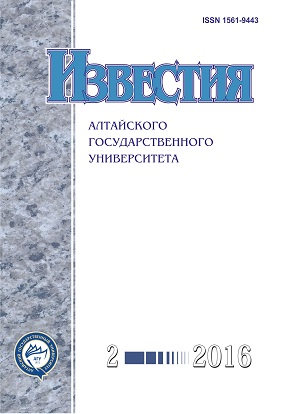The Role of Home-Policy Factors Influencing the Decision of the Soviet Leadership to Support the Chinese Administration of Xinjiang in Their Suppression of the National Movement of Indigenous Peoples of the Province in 1931–1934
Abstract
The article is devoted to the scientifically and politically important issue dealing with the problem of suppression of national movement of indigenous peoples in Xinjiang in the first half of the 1930‑s of the 20th century, implemented by Chinese authorities. Protests of the peoples of the province professing Islam caused economic plunder, humiliating attitude of the authorities to their culture, traditions, customs and beliefs. The Soviet leadership provided the regional administration with active and comprehensive assistance in defeating the insurgency. On the basis of the sources identified in the central archives of Russia, the author makes the conclusion that the home-policy factors played a significant role in forcing Moscow to make the decision to provide Chinese national movement with aid in suppression of the rebels. In particular, one of the reasons was a difficult socio-economic situation in the border areas of the Soviet Central Asian Republics, which resulted from the collectivization campaign and led to the mass emigration of the native population to the neighboring Chinese territory. In addition, Basmachis, who had been fighting against the Soviet regime, left for Xinjiang and joined the insurgency troops.
DOI 10.14258/izvasu(2016)2-03
Downloads
Metrics
References
Российский государственный архив социально-политической истории (РГАСПИ). — Ф. 495. — Оп. 154. — Д. 457.
РГАСПИ. — Ф. 514. — Оп. 1. — Д. 48.
Архив внешней политики Российской Федерации (АВП РФ). — Ф. 2. — Оп. 18. — П. 40. — Д. 32.
Вritish Documents on Foreign Affairs: Reports and Papers from the Foreign Office Confidental Print. Part II. From the First to the Second World War. Series E. Asia, 1914–1939. — Vol. 20. — China, 1927–1931.— University Publications of America, 1994.
РГАСПИ. — Ф. 532. — Оп. 4. — Д. 327.
Beloff M. The Foreign Policy of Soviet Russia 1929–1941. Vol. I: 1929–1936. — L. ; N.Y. ; Toronto, 1968.
АВП РФ. — Ф. 8/08. — Оп. 16. — П. 162. — Д. 117.
РГАСПИ. — Ф. 71. — Оп. 34. — Д. 1530.
РГАСПИ. — Ф. 62. — Оп. 2. — Д. 2789.
РГАСПИ. — Ф. 62. — Оп. 2. — Д. 3037.
РГАСПИ. — Ф. 17 (Особая папка Политбюро). — Оп. 162. — Д. 11.
РГАСПИ. — Ф. 495. — Оп. 154. — Д. 12.
Izvestiya of Altai State University is a golden publisher, as we allow self-archiving, but most importantly we are fully transparent about your rights.
Authors may present and discuss their findings ahead of publication: at biological or scientific conferences, on preprint servers, in public databases, and in blogs, wikis, tweets, and other informal communication channels.
Izvestiya of Altai State University allows authors to deposit manuscripts (currently under review or those for intended submission to Izvestiya of Altai State University) in non-commercial, pre-print servers such as ArXiv.
Authors who publish with this journal agree to the following terms:
- Authors retain copyright and grant the journal right of first publication with the work simultaneously licensed under a Creative Commons Attribution License (CC BY 4.0) that allows others to share the work with an acknowledgement of the work's authorship and initial publication in this journal.
- Authors are able to enter into separate, additional contractual arrangements for the non-exclusive distribution of the journal's published version of the work (e.g., post it to an institutional repository or publish it in a book), with an acknowledgement of its initial publication in this journal.
- Authors are permitted and encouraged to post their work online (e.g., in institutional repositories or on their website) prior to and during the submission process, as it can lead to productive exchanges, as well as earlier and greater citation of published work (See The Effect of Open Access).








